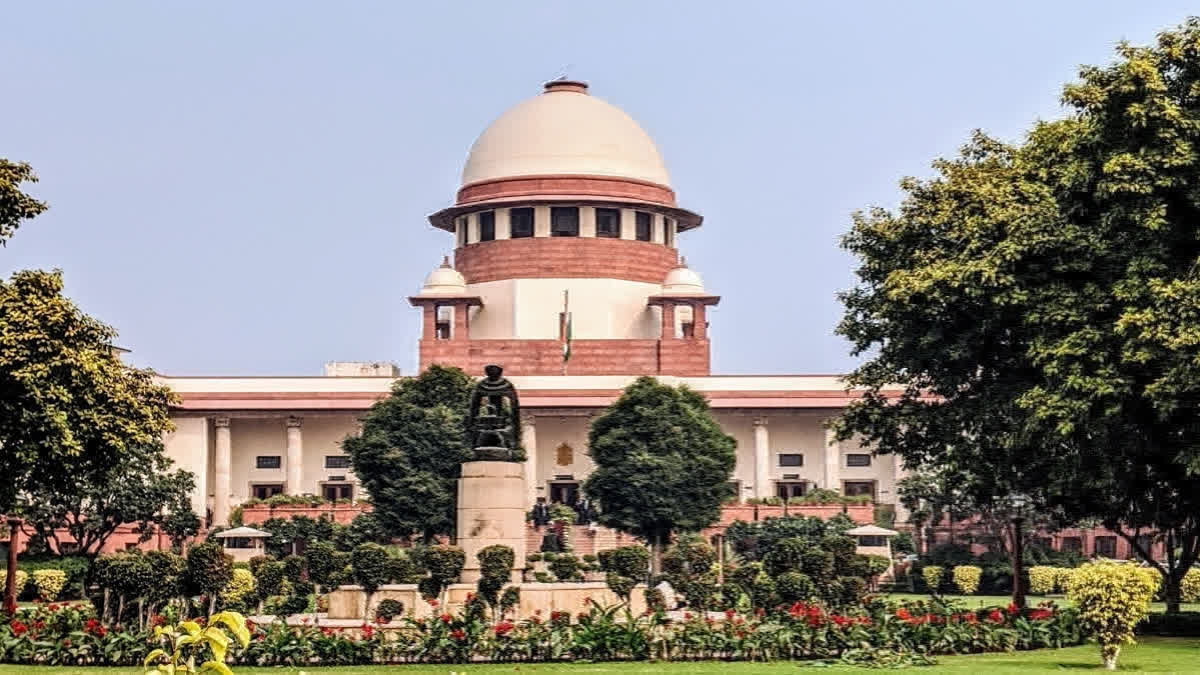New Delhi: The Supreme Court on Thursday sought the Centre's response on pleas challenging the validity of the Places of Worship (Special Provisions) Act, 1991, and also restrained courts across the country to admit or pass orders in any fresh suit or plea seeking a survey of mosques to determine whether temples lie beneath them.
The 1991 Act bars any change in the religious character of places of worship after August 15, 1947. A three-judge bench led by Chief Justice of India Sanjiv Khanna said, “We can't decide this without Centre's response", and also made it clear that no order of survey or any other effective order to be passed by courts in existing suits as well.
The bench, also comprising Justices Sanjay Kumar and K V Viswanathan, asked the Centre to file its response in four weeks while restraining the trial courts across the country from taking cognisance of any fresh suits filed claiming that mosques were earlier Hindu temples, which were destroyed during the Mughal rule. The apex court' order is a virtual stay on all cases relating to reclamation of temple structures across the country.
The bench noted that it deems it appropriate that fresh suits may be filed, but no suits would be registered and no proceedings undertaken till further orders by it.
The CJI said: "The matter requires consideration…once we say issues regarding section 3 and 4 (of the Act) require consideration, will it not be proper that there is a stay of hand by other courts….When the matter is pending before us and we are examining the matter, will it be just and fair for any other court to examine?”
“We are examining the ambit of the Act. Therefore, at this stage when we are examining the issue…no effective and final orders, including the orders of the survey can be passed. No effective interim or final orders will be passed till the next date of hearing”, said the CJI.
During the hearing, Justice Vishwanathan said, “There is a larger question. Section 3, one of the arguments you have to meet and that is why suits, which are pending, have to be stayed. Section 3, one view is only an effective manifestation or reiteration of the already embedded constitutional principles.….when you have a judgment of five-judges setting out certain principles, civil courts’ cannot run a race with the Supreme Court, as simple as that”.
The order passed by the apex court would effectively stall proceedings in 18 pending suits, which raise disputes over 10 mosques including Varanasi's Gyanvapi mosque and Shahi Idgah at Mathura.
The apex court had first issued notice to the Centre seeking its reply to the pleas challenging the Act in March 2021. Following that, the apex court issued notices on several related pleas and applications and tagged all matters so they could be heard together.
The apex court is seized of the pleas, including one filed by Ashwini Upadhyay who has prayed that sections 2, 3 and 4 of the Places of Worship (Special Provisions) Act, 1991 be set aside. One of the main contentions raised in the plea is that these provisions take away the right of judicial remedy to reclaim a place of worship of any person or a religious group.
During the hearing, the CJI made it clear to the Solicitor General Tushar Mehta, representing the Centre, that the government should file its reply in the matter.
Mehta said Centre will file an affidavit. The bench noted that 12 applications have been allowed in the matter and a number of other applications have been filed.
"Till the next date of hearing, no further suits can be registered. Existing suits can continue…," said the bench. A counsel said the matter can go to a five-judge bench.
The CJI replied "we will examine it once we begin hearing" and the court will examine issues raised in the matter, and added, “We are a three-judge bench, if there is a need we decide that after we start hearing”.
The bench said that fresh suits can be filed but they will not be registered. A counsel urged the bench to stay the proceedings in the suits filed across the country and stressed that surveys need to be stopped.
The Hindu side lawyers’ opposed this submission. “One of the suits is already pending before us (Krishna Janmabhoomi-Shahi Idgah dispute in Mathura)”, asked the bench. Mehta said, would it be possible for a stranger, a private party, to come and say stay all the suits? That is the question the court would have to decide.



